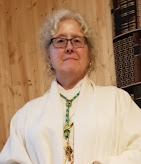
I was asked to explain why the eating of fruit lead to separation from God.
I will preface my response by pointing out there are always multiple levels of interpretation when exploring symbolism, and this is certainly true of sacred religious and spiritual texts. Alongside this issue of levels of meaning, is the question of context: by whom was the text written, to whom was the text written, for what purpose(s)?
One way of grouping levels of interpretation is four-fold: (1) Literally, feet planted firmly on the earth; (2) Logically, abstracting the ideas, seeking patterns and making predictions; (3) Heart-felt emotional response, seeking to feel the truth of the inner meaning; and (4) a Soulful-Spiritual connection, seeking to illuminate some direct experience of the numinous experience of the encounter with the Divine.
To answer this question, I do not find the literal level very useful. We have an anthropomorphic God walking in the garden, a serpent speaking with the only woman on the planet, trying to get her to believe that God has lied to her, and that if she does eat of the fruit, she will not die, but instead she will become like God, knowing Good and Evil.
Symbolically however, this is a very powerful and deeply mysterious story. It is questioning the mystery of our creation as self-aware sentient beings, and our sense of loss or separation from THE ALL (the I Am, I Am That I Am, Beingness-Itself, the Ground of Being, in a word: God).
To some degree we can profit by engaging this story on a logical level, seeking patterns of meaning, and I certainly do so as I attempt to explain something of what I believe to be the mythological significance of the story. But I do not feel this is the most meaningful level of understanding.
As an aside, I do not use the word mythological in any negative sense. Quite the opposite. The late professor Ron Miller made a statement I often repeat to summarize the sense in which I use the word mythological: Everything in the bible is true; and some of it actually happened.
Emotionally, I find the story feels true. It grabs at my heart and there is a sense in my gut there is something about this story that pulls me into it. There is something of each of us to be found in this story. Each character speaks a truth from their own perspective.
At the level of the soul, I sense a truth as well, but for me, I suspect we will not feel the full impact at this level whilst in our human form. This is the angst we feel as a result of the separation.

For me this story is grasping with the dawning awareness of our own self-awareness. This is the dawning of consciousness, and even more, of self-consciousness.
The Tree of Knowledge of Good and of the Knowledge of Evil means knowing everything, not just the extremes of Good and Evil, but of everything that is found between. And this knowledge comes by experiencing the world as self-aware beings.
The serpent was quite right, if we become self-aware, sentient, we are as gods in that we may come to know everything, and do so in full light of our consciousness - as opposed to experiencing life and it's events as disconnected moments, unable to see beyond the setting sun to the coming sunrise.
It is not that anyone of us will literally know everything. We do however, now see with open eyes, making connection from the past into the future, and even across generations. We become the builders of worlds. This is a very god-like power. The serpent spoke truthfully.
But God was also speaking truthfully when he said eating of the fruit would bring our deaths. I'm not speaking of physical death. I speak of the separation from THE ALL. We cannot simultaneously be one-with-God and hold onto our own sense of self, to hold our sense of ego. We are now truly separated from God. And that is a kind of death, of separation, and profound isolation. At times it is terrible, and it can become a crushing weight.
A great deal of religious and spiritual teachings try to work out how we might regain communion with the Divine once more. We certainly see this struggle appearing again and again throughout the Hebrew bible and the Christian New Testament.
We are lonely, isolated beings, trapped by our own ego, trapped by our own sense of self, yet we yurn for a sense of connection, of community, first amongst ourselves, and ultimately we hope for that ultimate Communion with the Divine, to (once again) be one with God.
We desire that feeling of, and the reality of, the I AM of which Jesus spoke, for that redemption and adoption by God, so that we too might share in THE ALL: I AM.

For sacramental Christians this is found in the experience of the Holy Eucharist, in which we eat and drink of the Body and Blood of Christ, bringing his spiritual reality into our very bodies.
It is then incumbent to us to carry this Light into the world through our actions, and our interactions with others, and in this way, through us, God's energy or essence, flows into the world, to others, so they too are able to feel and see this Light, and ultimately come to share in it themselves.
Bishop Erik E. Weaver
Associate Dean Ekklesia Epignostika Church and Seminary















